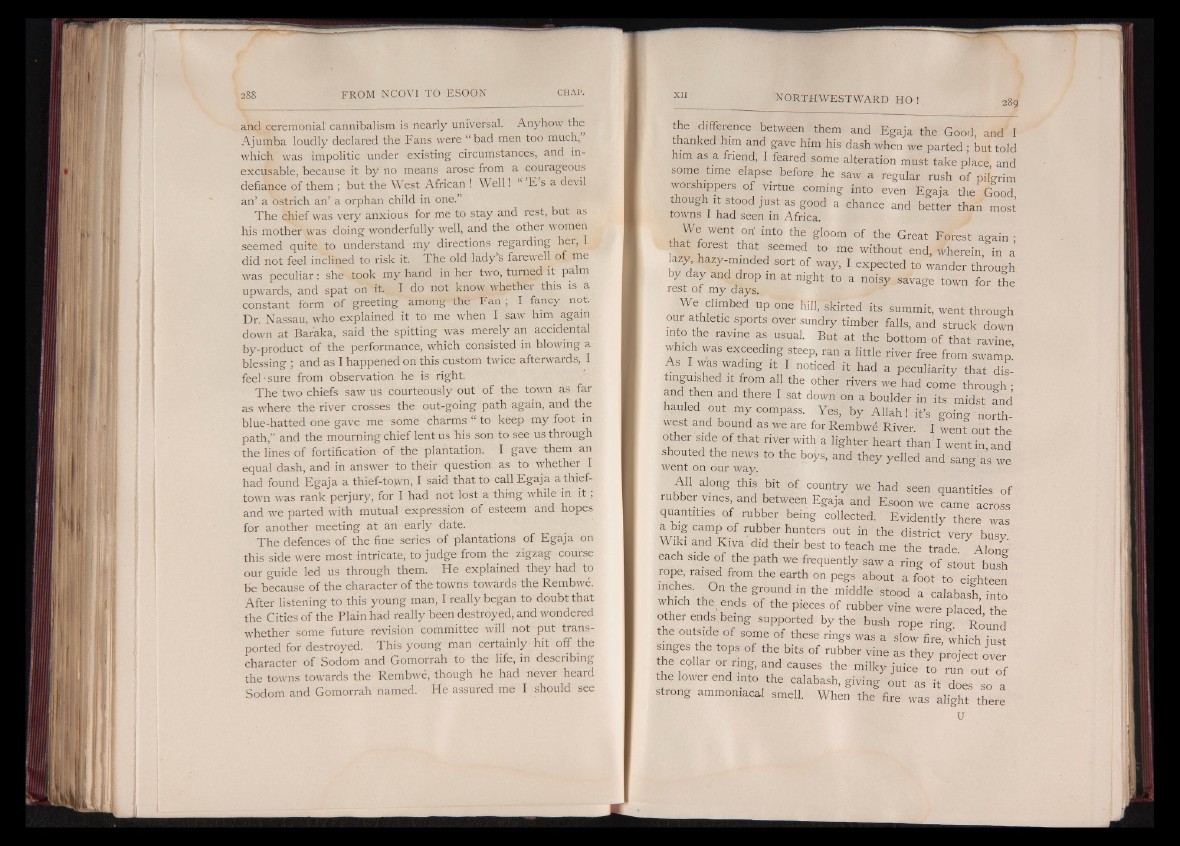
and ceremonial cannibalism is nearly universal. Anyhow the
Ajumba loudly declared the Fans were “ bad men too much,
which was impolitic under existing circumstances, and inexcusable,
because it by no means arose from a courageous
defiance of them ; but the West African ! Well! “ Es a devil
an’ a ostrich an’ a orphan child in one.”
The chief was very anxious for me to stay and rest, but as
his mother was doing wonderfully well, and the other women
seemed quite to understand my directions regarding her, I
did not feel inclined to risk it. The old lady’s farewell of me
was peculiar: she took my hand in her two, turned it palm
upwards, and spat on it. I do not know whether this is a
constant form of greeting among the Fan ; I fancy not.
Dr. Nassau, who explained it to me when I saw him again
down at Baraka, said the spitting was merely an accidental
by-product of the performance, which consisted in blowing a
blessing ; and as I happened on this custom twice afterwards, I
feel • sure from observation he is right.
The two chiefs saw us courteously out of the town as far
as where the river crosses the out-going path again, and the
blue-hatted one gave me some charms “ to keep my foot in
path,” and the mourning chief lent us his son to see us through
the lines of fortification of the plantation. I gave them an
equal dash, and in answer to their question as to whether I
had found Egaja a thief-tojvn, I said that to callEgaja a thief-
town was rank perjury, for I had not lost a thing while in it ;
and we parted with mutual expression of esteem and hopes
for another meeting at an early date.
The defences of the fine series of plantations of Egaja on
this side were most intricate, to judge from the zigzag course
our guide led us through them. He explained they had to
be because of the character of the towns towards the Rembwé.
After listening to this young man, I really began to doubt that
the Cities of the Plain had really been destroyed, and wondered
whether some future revision committee will not put transported
for destroyed. This young man certainly hit off the
character of Sodom and Gomorrah to the life, in describing
the towns towards the Rembwé, though he had never heard
Sodom and Gomorrah named. He assured me I should see
the difference between them and Egaja the Good, and I
thanked him and gave him his dash when we parted ; but told
him as a friend, I feared some alteration must take pJace and
some time elapse before he saw a regular rush of pilgrim
worshippers of virtue coming into even Egaja the Good
though it stood just as good a chance and better than most
towns I had seen in Africa.
We went on' into the gloom of the Great Forest again :
| at forest that seemed to me without end, wherein, in a
lazy, hazy-minded sort of way, I expected to wander through
y ay and drop in at night to a noisy savage town for the
rest of my days.
We climbed up one hill, skirted its summit, went through
our athletic sports over sundry timber falls, and struck down
into the ravine as usual. But at the bottom of that ravine
which was exceeding steep, ran a little river free from'swamp’
As I was wading it I noticed it had a peculiarity that distinguished
it from all the other rivers we had come through ■
an then and there I sat down on a boulder in its midst and
hauled out my compass. Yes, by Allah! it’s going northwest
and bound as we are for Rembwd River. ] went out the
other side of that river with a lighter heart than ' I went in and
shouted the news to the boys, and they yelled and sang’as we
went on our way.
All along this bit of country we had seen quantities of
rubber vines, and between Egaja and Esoon we came across
quantities oi rubber being collected. Evidently there was
a big camp of rubber hunters out in the district very busy
Wiki and Kiva did their best to teach me the trade. Along
each side of the path we frequently saw a ring of stout bush
rope, raised from the earth on pegs about a foot to eighteen
^ ^ gr°Und “ the middIe stood a calabash, into
which the ends of the pieces of rubber vine were placed, the
other ends.being supported by the bush rope ring. Round
the outside of some of these rings was a slow fire, which just
singes the tops of the bits of rubber vine as they project over
he collar or ring, and causes the milky juice to run out of
the lower end into the calabash, giving out as it does so a
strong ammoniacal smell. When the fire was alight there u